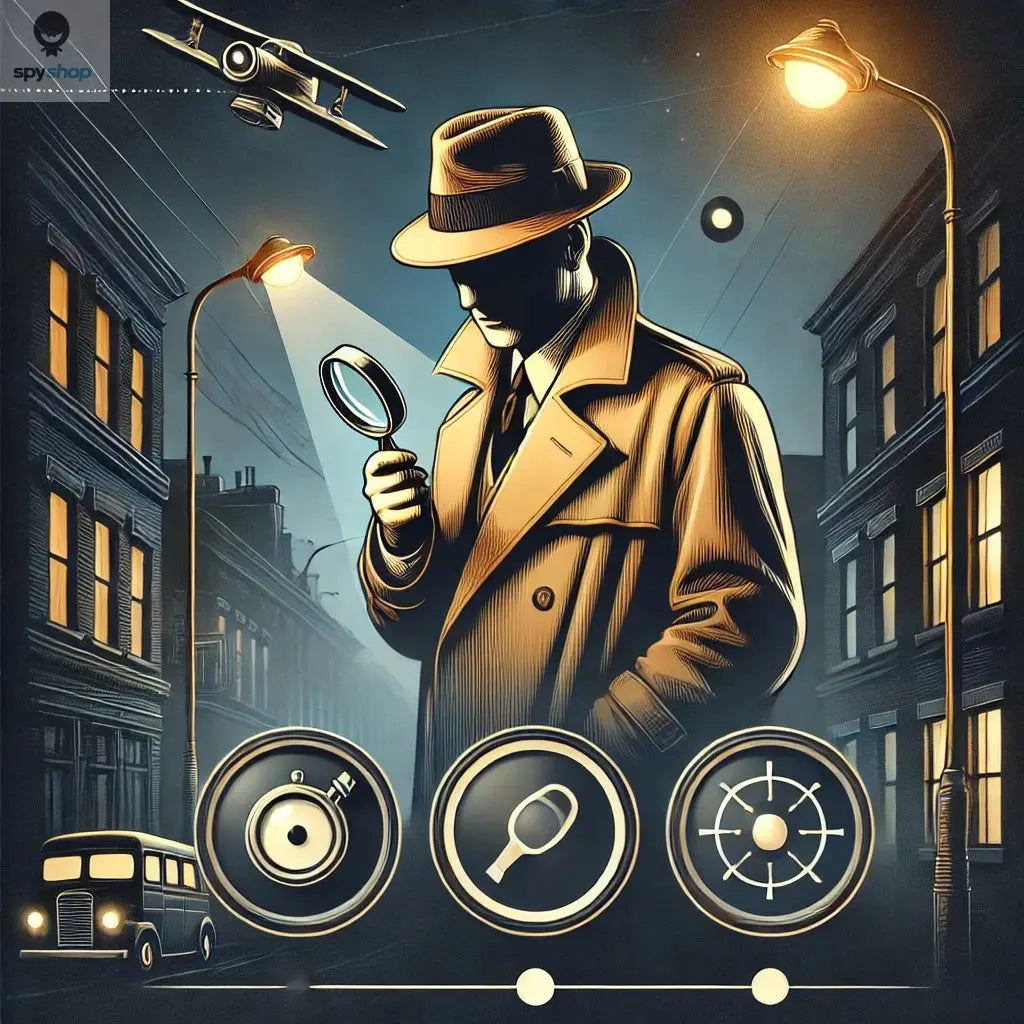
Top Methods Employed By Private Detectives
Man dressed as a detective, wearing a trench coat and hat, holding a magnifying glass with a smile.
Tags: Surveillance Techniques, Private Detective, Investigation Methods
If you are considering hiring a private investigator, you're likely assessing the cost versus the potential outcome. In an era where information is power, the role and methods of private detectives have become indispensable. These skilled professionals navigate the grey areas of legality and ethics to uncover crucial information, often operating discreetly to reveal truths that might otherwise remain hidden.
From personal matters such as infidelity, stalking, and arranged marriages to corporate investigations like fraud detection, due diligence, and asset tracing, private detectives play a vital role. Understanding the tools, techniques, and legalities they adhere to is essential for anyone curious about this intriguing profession or seeking to hire a private investigator.
This article delves into the top methods employed by private detectives, highlighting their essential surveillance techniques, the critical legal and ethical considerations they navigate, and the sophisticated spy gadgets they use. Whether you're considering a career in this field, hiring a private investigator in the UK, or simply fascinated by the art of investigation, this guide will illuminate the fascinating world of private investigation.
Understanding the Role of a Private Investigator
Private investigators (PIs) are critical assets for gathering information for individuals, businesses, or organisations. Operating independently from law enforcement, they focus on private, corporate, or legal matters that do not always involve criminal charges. Their cases might include:
-
Infidelity investigations
-
Address or people tracing
-
Fraud detection
-
Monitoring suspected fraudulent activities
-
Verifying insurance claims
PIs use a mix of traditional and modern techniques, such as GPS tracking and advanced data analysis software, to deliver actionable intelligence. Their work often provides clients with the evidence needed for court cases or personal resolutions.
Essential Surveillance Techniques
Private investigators employ various surveillance methods tailored to each case's needs. Here are some key techniques:
Foot and Mobile Surveillance
Foot and mobile surveillance are crucial for tracking subjects’ movements. A team of 2-5 investigators often works in tandem, using different vehicles to maintain a covert watch. Effective surveillance involves seamlessly blending into surroundings and avoiding detection while capturing details about a subject’s interactions and location.
Static Surveillance
Static surveillance focuses on monitoring a fixed location. Investigators might observe a residence or business, often using disguised vehicles like delivery vans. They may also deploy cameras mounted on vehicles, motorbikes, or streetlights to capture high-quality footage discreetly.
Electronic Surveillance
Electronic surveillance uses digital tools to monitor communications like phone calls, emails, and social media activity. This approach requires advanced technological knowledge and strict adherence to legal guidelines to ensure admissibility in court.
Digital Surveillance
By analysing online behaviour, social media, and public records, investigators can uncover patterns and relationships. OSINT (Open Source Intelligence) is especially critical for cases involving cyber fraud.
Technical Surveillance
Technical tools like GPS trackers, hidden cameras, and listening devices provide detailed and accurate data. These gadgets are invaluable for discreet monitoring and require specialised skills to deploy effectively.
Legal and Ethical Considerations in Surveillance
Adherence to Privacy Laws
Private investigators must comply with privacy laws such as the General Data Protection Regulation (GDPR). This includes handling personal data with legitimate interest and ensuring data collection serves a clear purpose without infringing on privacy rights. Breaches of these laws can render evidence inadmissible in court.
Handling Evidence
All evidence must be collected legally to ensure its validity in court. Actions like trespassing or hacking can lead to legal repercussions. Proper evidence handling is crucial for maintaining the integrity of an investigation.
Confidentiality Standards
Confidentiality is paramount. Investigators must establish robust agreements with clients and store data securely using encryption and access controls. Proper disposal of physical and digital files ensures unauthorised access is prevented.
Technological Tools in Modern Investigations
High-definition Cameras
HD cameras capture clear video under varying conditions and can be discreetly placed within everyday objects. These tools are essential for surveillance.
GPS Tracking
GPS trackers enable investigators to monitor vehicle movements in real time. Compact and discreet, these devices are often attached to vehicles and provide critical data on subjects' locations and movements.
Drones
Drones offer aerial surveillance, capturing high-quality images and covering large areas quickly. They are particularly useful for reconnaissance and planning.
Cyber Surveillance Tools
Cyber tools enable investigators to monitor social media and online transactions, vital for uncovering fraud or harassment cases. Proficiency in cyber surveillance is essential for modern investigations.
The Art of Private Investigation
The tools and techniques used by private detectives, combined with their ingenuity and adaptability, define their craft. Whether using GPS trackers to monitor movements, drones for aerial surveillance, or high-definition cameras for covert operations, private investigators ensure every detail is captured discreetly and legally.
If you’re considering hiring a private investigator, ensure they are reputable and operate within legal boundaries. A skilled PI can provide invaluable insights, helping resolve complex issues with professionalism and integrity.


